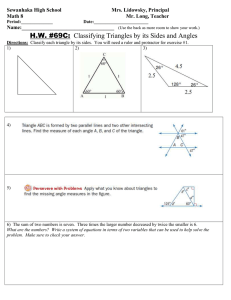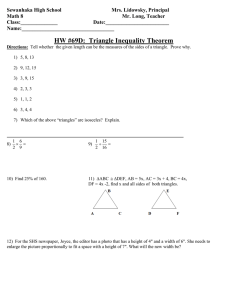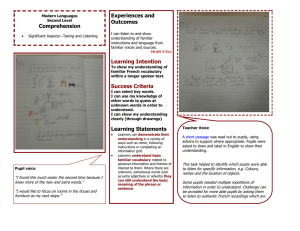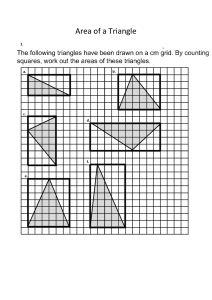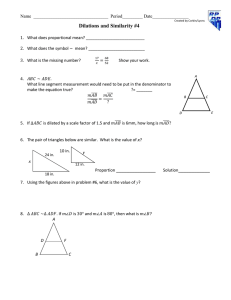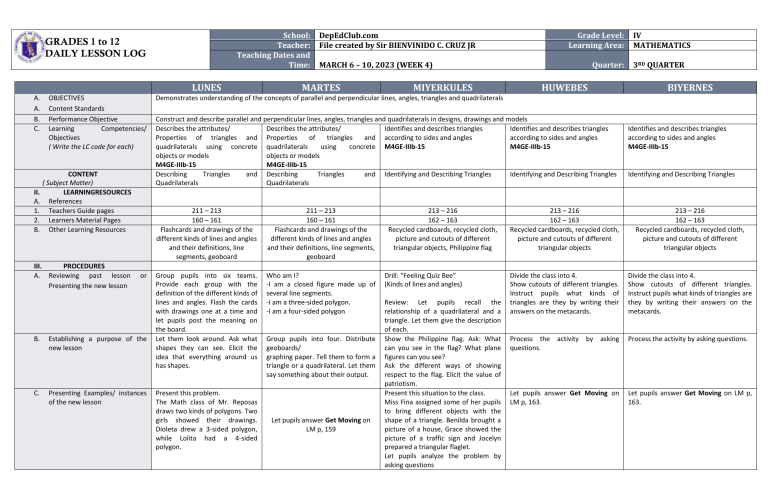
School: Teacher: Teaching Dates and Time: GRADES 1 to 12 DAILY LESSON LOG LUNES A. A. B. C. II. A. 1. 2. B. OBJECTIVES Content Standards Performance Objective Learning Competencies/ Objectives ( Write the LC code for each) CONTENT ( Subject Matter) LEARNINGRESOURCES References Teachers Guide pages Learners Material Pages Other Learning Resources III. PROCEDURES A. Reviewing past lesson Presenting the new lesson or B. Establishing a purpose of the new lesson C. Presenting Examples/ instances of the new lesson DepEdClub.com File created by Sir BIENVINIDO C. CRUZ JR Grade Level: Learning Area: MARCH 6 – 10, 2023 (WEEK 4) MARTES MIYERKULES Quarter: HUWEBES IV MATHEMATICS 3RD QUARTER BIYERNES Demonstrates understanding of the concepts of parallel and perpendicular lines, angles, triangles and quadrilaterals Construct and describe parallel and perpendicular lines, angles, triangles and quadrilaterals in designs, drawings and models Describes the attributes/ Describes the attributes/ Identifies and describes triangles Identifies and describes triangles Properties of triangles and Properties of triangles and according to sides and angles according to sides and angles quadrilaterals using concrete quadrilaterals using concrete M4GE-IIIb-15 M4GE-IIIb-15 objects or models objects or models M4GE-IIIb-15 M4GE-IIIb-15 Describing Triangles and Describing Triangles and Identifying and Describing Triangles Identifying and Describing Triangles Quadrilaterals Quadrilaterals 211 – 213 160 – 161 Flashcards and drawings of the different kinds of lines and angles and their definitions, line segments, geoboard 211 – 213 160 – 161 Flashcards and drawings of the different kinds of lines and angles and their definitions, line segments, geoboard Group pupils into six teams. Provide each group with the definition of the different kinds of lines and angles. Flash the cards with drawings one at a time and let pupils post the meaning on the board. Let them look around. Ask what shapes they can see. Elicit the idea that everything around us has shapes. Who am I? -I am a closed figure made up of several line segments. -I am a three-sided polygon. -I am a four-sided polygon Present this problem. The Math class of Mr. Reposas draws two kinds of polygons. Two girls showed their drawings. Dioleta drew a 3-sided polygon, while Lolita had a 4-sided polygon. Group pupils into four. Distribute geoboards/ graphing paper. Tell them to form a triangle or a quadrilateral. Let them say something about their output. Let pupils answer Get Moving on LM p, 159 213 – 216 162 – 163 Recycled cardboards, recycled cloth, picture and cutouts of different triangular objects, Philippine flag Drill: “Feeling Quiz Bee” (Kinds of lines and angles) Review: Let pupils recall the relationship of a quadrilateral and a triangle. Let them give the description of each. Show the Philippine flag. Ask: What can you see in the flag? What plane figures can you see? Ask the different ways of showing respect to the flag. Elicit the value of patriotism. Present this situation to the class. Miss Fina assigned some of her pupils to bring different objects with the shape of a triangle. Benilda brought a picture of a house, Grace showed the picture of a traffic sign and Jocelyn prepared a triangular flaglet. Let pupils analyze the problem by asking questions Identifies and describes triangles according to sides and angles M4GE-IIIb-15 Identifying and Describing Triangles 213 – 216 162 – 163 Recycled cardboards, recycled cloth, picture and cutouts of different triangular objects 213 – 216 162 – 163 Recycled cardboards, recycled cloth, picture and cutouts of different triangular objects Divide the class into 4. Show cutouts of different triangles. Instruct pupils what kinds of triangles are they by writing their answers on the metacards. Divide the class into 4. Show cutouts of different triangles. Instruct pupils what kinds of triangles are they by writing their answers on the metacards. Process the activity by asking questions. Process the activity by asking questions. Let pupils answer Get Moving on LM p, 163. Let pupils answer Get Moving on LM p, 163. D. E. Discussing new concepts and practicing new skills no.1. Discussing new concepts practicing new skills no.2 and F. Developing Mastery (Leads to Formative Assessment 3.) G. Finding practical application of concepts and skills in daily living H. Making Generalization and abstraction about the lesson I. Evaluating learning Show the drawings made by the two girls. Ask: What do you call the first drawing? How about the second one? What is a polygon? (A polygon is a closed figure made up of several line segments that are joined together? What do you call a 3-sided polygon? What about a 4-sided polygon? Paste cut outs of triangles and Quadrilaterals. Let pupils group them according to number of sides and let them give the name of each group. Allow pupils to name objects that have a triangle and a quadrilateral shapes. What is a polygon? Describe a triangle and a quadrilateral. Identify if the illustrations below are triangles or Let pupils answer Keep Moving on LM p, 161 Show the pictures of the different objects mentioned. Ask: Observe the different triangular objects? How will you describe the different triangular objects? Let pupils answer Keep Moving on LM p, 163. Let pupils do Apply Your Skills on LM p, 163 Let pupils answer Keep Moving on LM p, 163. Let pupils do Apply Your Skills on LM p, 163 Let pupils do the Performing the Activities on TG p. 214. Name Game. Let pupils name objects that have triangular shapes. Let them defend why they are isosceles, right, etc. Name Game. Let pupils name objects that have triangular shapes. Let them defend why they are isosceles, right, etc. Do the Processing the Activity on TG p. 215 Matching game. Call volunteers. One will hold the strips with descriptions of triangles and the other one with the illustration. At the signal, let them match each other. Matching game. Call volunteers. One will hold the strips with descriptions of triangles and the other one with the illustration. At the signal, let them match each other. Give cutouts of different triangles. Let them identify what kind of angles are they. They can use ruler or protractor. What are the different triangles according to sides? According to angles? How are triangles classified? How are triangles classified? Name the triangle described in each item. 1. It is a triangle which has the right angle. 2. It is a triangle which has an obtuse angle. 3. It is a triangle which has 3 acute angles. 4. It is a triangle which has 2 equal sides. 5. It is a triangle which has no equal sides. Give the Home Activity on TG p. 216. Name the triangle described in each item. 1. It is a triangle which has the right angle. 2. It is a triangle which has an obtuse angle. 3. It is a triangle which has 3 acute angles. 4. It is a triangle which has 2 equal sides. 5. It is a triangle which has no equal sides. Give a game on identifying triangles and quadrilaterals. Group pupils into 6. Let them form a quadrilateral if their answer to the question is yes and form a triangle if their answer is no. -Do all quadrilaterals have four sides and angles? -Do all quadrilaterals can be divided into 2 triangles? -Is any 3-sided polygon a triangle? -Is any 4-sided polygon a quadrilateral? Let pupils do Apply Your Skills on LM p, 161 Ask these questions to lead pupils give the following generalizations: What is a triangle? What is a Quadrilateral? Draw a triangle if the object mentioned represents a triangle. Original File Submitted and Formatted by DepEd Club Member - visit depedclub.com for more A. Identify the triangles according to sides. Give the Home Activity on TG p. 216. quadrilaterals. J. Additional activities for application and remediation V.REMARKS VI.REFLECTION A. B. C. D. E. No. of learners who earned 80% in the evaluation No. of learners who require additional activities for remediation who scored below 80% Did the remedial lessons work? No. of learners who have caught up with the lesson No. of learners who continue to require remediation Which of my teaching strategies worked well? Why did these work? Draw 3 different triangles and 3 different quadrilaterals ___ of Learners who earned 80% above Draw a quadrilateral if it is not. 1. Abe is reading a book. 2. Ian is using a tripod in doing his experiment. 3. Amado is opening the door. 4. Gani is holding an ice cream cone. 5. Rafael is writing on the chalkboard. Give the Home Activity on TG p. 213. ___ of Learners who earned 80% above each item. 1. It is a triangle which has the right angle. 2. It is a triangle which has an obtuse angle. 3. It is a triangle which has 3 acute angles. 4. It is a triangle which has 2 equal sides. 5. It is a triangle which has no equal sides. each item. 1. It is a triangle which has the right angle. 2. It is a triangle which has an obtuse angle. 3. It is a triangle which has 3 acute angles. 4. It is a triangle which has 2 equal sides. 5. It is a triangle which has no equal sides. ___ of Learners who earned 80% above ___ of Learners who earned 80% above ___ of Learners who earned 80% above B. Identify the triangles according to angles. Cutouts examples of triangles according to sides and angles. ___ of Learners who require additional activities for remediation ___ of Learners who require additional activities for remediation ___ of Learners who require additional activities for remediation ___ of Learners who require additional activities for remediation ___ of Learners who require additional activities for remediation ___Yes ___No ____ of Learners who caught up the lesson ___Yes ___No ____ of Learners who caught up the lesson ___Yes ___No ____ of Learners who caught up the lesson ___Yes ___No ____ of Learners who caught up the lesson ___Yes ___No ____ of Learners who caught up the lesson ___ of Learners who continue to require remediation ___ of Learners who continue to require remediation ___ of Learners who continue to require remediation ___ of Learners who continue to require remediation ___ of Learners who continue to require remediation Strategies used that work well: ___ Group collaboration ___ Games ___ Power Point Presentation ___ Answering preliminary activities/exercises ___ Discussion ___ Case Method Strategies used that work well: ___ Group collaboration ___ Games ___ Power Point Presentation ___ Answering preliminary activities/exercises ___ Discussion ___ Case Method Strategies used that work well: ___ Group collaboration ___ Games ___ Power Point Presentation ___ Answering preliminary activities/exercises ___ Discussion ___ Case Method Strategies used that work well: ___ Group collaboration ___ Games ___ Power Point Presentation ___ Answering preliminary activities/exercises ___ Discussion ___ Case Method Strategies used that work well: ___ Group collaboration ___ Games ___ Power Point Presentation ___ Answering preliminary activities/exercises ___ Discussion ___ Case Method F. What difficulties did I encounter which my principal or supervisor can help me solve? G. What innovation or localized materials did I use/discover which I wish to share with other teachers? ___ Think-Pair-Share (TPS) ___ Rereading of Paragraphs/ Poems/Stories ___ Differentiated Instruction ___ Role Playing/Drama ___ Discovery Method ___ Lecture Method Why? ___ Complete IMs ___ Availability of Materials ___ Pupils’ eagerness to learn ___ Group member’s Cooperation in doing their tasks __ Bullying among pupils __ Pupils’ behavior/attitude __ Colorful IMs __ Unavailable Technology Equipment (AVR/LCD) __ Science/ Computer/ Internet Lab __ Additional Clerical works __Reading Readiness __Lack of Interest of pupils Planned Innovations: __ Localized Videos __ Making use big books from views of the locality __ Recycling of plastics to be used as Instructional Materials __ local poetical composition __Fashcards __Pictures ___ Think-Pair-Share (TPS) ___ Rereading of Paragraphs/ Poems/Stories ___ Differentiated Instruction ___ Role Playing/Drama ___ Discovery Method ___ Lecture Method Why? ___ Complete IMs ___ Availability of Materials ___ Pupils’ eagerness to learn ___ Group member’s Cooperation in doing their tasks __ Bullying among pupils __ Pupils’ behavior/attitude __ Colorful IMs __ Unavailable Technology Equipment (AVR/LCD) __ Science/ Computer/ Internet Lab __ Additional Clerical works __Reading Readiness __Lack of Interest of pupils Planned Innovations: __ Localized Videos __ Making use big books from views of the locality __ Recycling of plastics to be used as Instructional Materials __ local poetical composition __Fashcards __Pictures ___ Think-Pair-Share (TPS) ___ Rereading of Paragraphs/ Poems/Stories ___ Differentiated Instruction ___ Role Playing/Drama ___ Discovery Method ___ Lecture Method Why? ___ Complete IMs ___ Availability of Materials ___ Pupils’ eagerness to learn ___ Group member’s Cooperation in doing their tasks __ Bullying among pupils __ Pupils’ behavior/attitude __ Colorful IMs __ Unavailable Technology Equipment (AVR/LCD) __ Science/ Computer/ Internet Lab __ Additional Clerical works __Reading Readiness __Lack of Interest of pupils Planned Innovations: __ Localized Videos __ Making use big books from views of the locality __ Recycling of plastics to be used as Instructional Materials __ local poetical composition __Fashcards __Pictures ___ Think-Pair-Share (TPS) ___ Rereading of Paragraphs/ Poems/Stories ___ Differentiated Instruction ___ Role Playing/Drama ___ Discovery Method ___ Lecture Method Why? ___ Complete IMs ___ Availability of Materials ___ Pupils’ eagerness to learn ___ Group member’s Cooperation in doing their tasks __ Bullying among pupils __ Pupils’ behavior/attitude __ Colorful IMs __ Unavailable Technology Equipment (AVR/LCD) __ Science/ Computer/ Internet Lab __ Additional Clerical works __Reading Readiness __Lack of Interest of pupils Planned Innovations: __ Localized Videos __ Making use big books from views of the locality __ Recycling of plastics to be used as Instructional Materials __ local poetical composition __Fashcards __Pictures ___ Think-Pair-Share (TPS) ___ Rereading of Paragraphs/ Poems/Stories ___ Differentiated Instruction ___ Role Playing/Drama ___ Discovery Method ___ Lecture Method Why? ___ Complete IMs ___ Availability of Materials ___ Pupils’ eagerness to learn ___ Group member’s Cooperation in doing their tasks __ Bullying among pupils __ Pupils’ behavior/attitude __ Colorful IMs __ Unavailable Technology Equipment (AVR/LCD) __ Science/ Computer/ Internet Lab __ Additional Clerical works __Reading Readiness __Lack of Interest of pupils Planned Innovations: __ Localized Videos __ Making use big books from views of the locality __ Recycling of plastics to be used as Instructional Materials __ local poetical composition __Fashcards __Pictures
